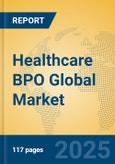Market Size and Growth Forecast
The global healthcare BPO market is projected to reach between USD 250 billion and USD 350 billion in 2025, with a compound annual growth rate (CAGR) of 7% to 13% through 2030, reflecting the healthcare industry's continued focus on cost optimization, digital transformation, and operational excellence.Regional Analysis
North America: The United States dominates with extensive healthcare BPO adoption across provider and payer organizations, driven by complex billing systems and regulatory requirements, while Canada focuses on specialized services and cross-border delivery capabilities.Europe: Germany leads in pharmaceutical BPO services and medical device support, France emphasizes healthcare IT outsourcing and clinical research services, and the UK concentrates on NHS support services and international healthcare consulting.
Asia Pacific: India serves as the global hub for healthcare BPO services with extensive English-speaking workforce and cost advantages, China experiences rapid growth in domestic healthcare outsourcing, while Philippines and Malaysia focus on specialized healthcare support services.
Rest of the World: Brazil develops healthcare BPO capabilities for Latin American markets, while Middle Eastern countries, particularly the UAE, invest in healthcare BPO as part of economic diversification strategies and regional healthcare hub development.
Service Type Analysis
Provider Outsourcing Services: Expected growth of 8.0-14.0%, driven by revenue cycle management complexity, medical coding requirements, and clinical documentation needs. Trends focus on artificial intelligence integration for automated coding, predictive analytics for denial management, and comprehensive revenue cycle optimization that improves cash flow and reduces administrative burden for healthcare providers.Payer Outsourcing Services: Projected growth of 7.5-12.5%, linked to insurance industry consolidation, regulatory compliance requirements, and member service expectations. Developments emphasize digital customer experience platforms, automated claims processing, and fraud detection systems that enhance operational efficiency while improving member satisfaction.
Operation Services: Anticipated growth of 6.5-12.0%, encompassing human resources, finance, procurement, and IT support functions. Advances prioritize cloud-based service delivery, robotic process automation, and integrated business intelligence platforms that provide real-time operational insights and strategic decision support.
Key Market Players
Leading companies include Accenture, providing comprehensive healthcare consulting and technology services; Cognizant Technology Solutions Corporation, specializing in healthcare IT and business process services; Tata Consultancy Services Limited, offering end-to-end healthcare transformation solutions; Conduent Incorporated, focusing on government healthcare programs and business process automation; WNS (Holdings) Limited, providing specialized healthcare analytics and processing services; NTT Data Group Corporation, delivering healthcare technology integration and support; Mphasis, emphasizing digital transformation and automation; Genpact Limited, offering healthcare analytics and operational excellence; Wipro Limited, providing comprehensive healthcare BPO and technology solutions; Infosys BPM, specializing in intelligent automation and digital services. Additional key players include Firstsource Solutions Limited, International Business Machines Corporation, GeBBS, Capgemini, Omega Healthcare Management Services, UnitedHealth Group, HCL Technologies Limited, Parexel International, Access Healthcare, Sutherland Global, Vee Healthtek, AGS Health, 1840 & Company, and Invensis Technologies, each contributing specialized expertise in healthcare operations, technology integration, and regulatory compliance.Porter's Five Forces Analysis
Threat of New Entrants: Moderate, due to healthcare industry knowledge requirements, regulatory compliance complexities, and established client relationships, though technology companies and digital-native firms can enter specialized niches with innovative solutions.Threat of Substitutes: Low to moderate, with automation technologies and in-house capability development representing alternatives, though the specialized nature of healthcare processes and regulatory requirements maintain strong demand for expert outsourcing services.
Bargaining Power of Buyers: High, with large healthcare organizations, insurance companies, and government programs wielding significant influence over service providers through volume contracts and comprehensive service requirements.
Bargaining Power of Suppliers: Low to moderate, due to abundant global service provider options and standardized service offerings, though specialized expertise in specific healthcare domains may create supplier advantages.
Competitive Rivalry: High, with established BPO companies, technology firms, and specialized healthcare service providers competing on cost, quality, compliance capabilities, and technological innovation.
Market Opportunities and Challenges
Opportunities
The healthcare industry's digital transformation initiatives create substantial demand for specialized BPO services supporting electronic health record implementation, interoperability projects, and data analytics capabilities.Aging populations in developed countries require expanded healthcare services, driving demand for operational support in areas like claims processing, member services, and clinical documentation.
Value-based care models necessitate advanced analytics, quality reporting, and population health management services that BPO providers can deliver more cost-effectively than in-house capabilities.
Artificial intelligence and machine learning technologies enable new service offerings including predictive analytics, automated clinical coding, and intelligent document processing that improve accuracy while reducing costs.
Telemedicine expansion and remote patient monitoring growth create opportunities for supporting services including patient scheduling, technical support, and data management.
Challenges:
Stringent healthcare data privacy regulations including HIPAA, GDPR, and emerging data protection laws create complex compliance requirements that increase operational costs and limit service delivery flexibility.Cybersecurity threats targeting healthcare data require substantial investments in security infrastructure and ongoing monitoring capabilities, with data breaches potentially resulting in significant financial and reputational damage.
Healthcare industry consolidation reduces the number of potential clients while increasing their bargaining power and service requirements complexity.
Automation and artificial intelligence advancement threaten traditional BPO service models, requiring continuous investment in technology and workforce transformation.
Additionally, cultural and communication challenges in global service delivery, combined with healthcare professionals' concerns about outsourcing clinical support functions, create adoption barriers that require careful management and relationship building.
This product will be delivered within 1-3 business days.
Table of Contents
Companies Mentioned
- Accenture
- Cognizant Technology Solutions Corporation
- Tata Consultancy Services Limited
- Conduent Incorporated
- WNS (Holdings) Limited
- NTT Data Group Corporation
- Mphasis
- Genpact Limited
- Wipro Limited
- Infosys BPM
- Firstsource Solutions Limited
- International Business Machines Corporation
- GeBBS
- Capgemini
- Omega Healthcare Management Services
- UnitedHealth Group
- HCL Technologies Limited
- Parexel International (MA) Corporation
- Access Healthcare
- Sutherland Global
- Vee Healthtek
- AGS Health
- 1840 & Company
- Invensis Technologies








